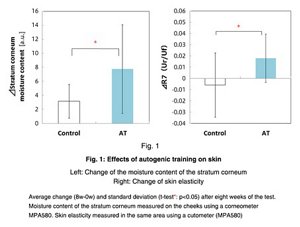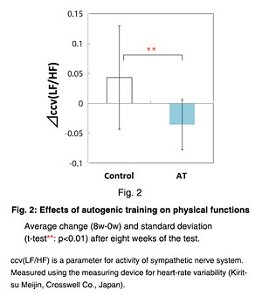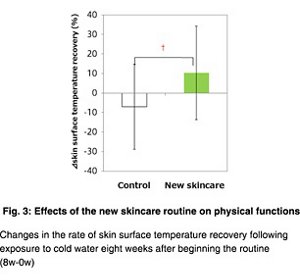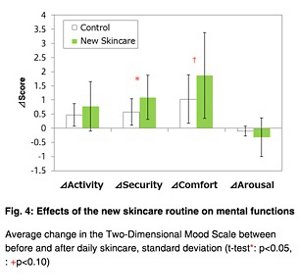Survey on the effects of autogenic training on the mind, body, and skin:
Ideas for a new type of holistic skincare
In 2015, the Skincare Laboratory of Kao Corporation (Michitaka Sawada, President) joined with Professor Yosuke Sakairi of University of Tsukuba (deputy president of the Japanese Society of Autogenic Therapy and Japanese Association of Mindfulness), to launch a series of studies on how autogenic training affects the mind, body, and skin. Their results now show that autogenic training practiced in everyday life affect a person's mental state, physical functions, and skin condition.
Moving forward with their results, Kao researchers have proposed new ideas for skincare that include elements of autogenic training. Their studies have confirmed that daily skincare based on autogenic training can reduce fatigue and improve the texture of the skin while improving autonomic functions.
Autogenic training
Autogenic training (AT) is a method of mental and physiological training developed by the German psychiatrist Johannes Heinrich Schultz in 1932 based on the principles of self-hypnosis. By quietly reciting a series of verbal formulas- "I am calm; nothing can disturb me", "My arms and legs are heavy" (for muscular relaxation) and "My arms and legs are warm" (for vascular dilation) - the therapy subject becomes passively aware of sensory changes taking place in her body. This mindful bodily awareness is thought to bring various psychological and physiological benefits such as reduced anxiety and tension, balanced activity of the autonomic nerve system, and a more stable body-mind balance. Autogenic training is widely adopted in psychosomatic medicine and has become a major form of relaxation training recommended by industrial and educational institutions for stress management. The method is easy to practice in daily life.
Effects of autogenic training on the skin and body
Fourteen post-menopausal women in their forties and fifties who felt that they had dry or sensitive skin were enrolled as testing subjects. Each subject was asked to conduct two autogenic training sessions(heaviness and warmth training)every day, once in the morning and once in the evening, for eight weeks. In each session, the subject sits on a chair, takes an easy posture, closes her eyes, and recites, "I am calm; Nothing can disturb me," to conjure a state of silence and concentration. Next, she recites the first AT formula, "My arms and legs are heavy" (for muscular relaxation), focuses on the sensations, recites the second AT formula," My arms and legs are warm" (for vascular dilation), and focuses again on the sensations. Finally, she opens and closes her hands and stretches while opening her eyes (for awaking). The subjects visited the research laboratory twice to undergo skin measurements: once before the start of the eight-week trial and once at the end. In place of the autogenic training, a control group of twelve women were asked simply to close their eyes for three minutes.


Compared with the control group, the women who had practiced autogenic training exhibited a significant increase in moisture in the stratum corneum of their cheeks (Fig. 1, left), as well increased skin elasticity (Fig. 1, right). In other physiological assessments, a clear difference between the groups was observed in the change of a heart rate variability parameter called ccvLF/HF (a parameter of activity of sympathetic nerve system) (Fig. 2).
Because both groups had used the same skincare, the increased skin elasticity and moisture of the stratum corneum in the training group could be credited to the autogenic training rather than the skincare products themselves. The autogenic training elicited both physical effects such as improved autonomic nerve system activity and cutaneous effects such as improved skin elasticity and moisturizing.
Kao's research has demonstrated dermatological effects of autogenic training in healthy post-menopausal women firstly.
Changes in skin, body, and mind in response to skincare methods based on autogenic training principles
After confirming dermatological effects of autogenic training, the researchers at Kao began trying to introduce essences of autogenic training into daily life in combination with the skincare routines most women perform in the morning and evening. They started to develop a new type of skincare method in which the subject closes her eyes and passively focuses on the changing conditions of the skin and body while applying her usual skincare. After the session, the subject jots down a record of the things she has noticed about her skin and body. This self-monitoring approach promotes the learning of "passive attention and concentration," the two principle concepts of autogenic training.
Thirteen women in their forties and fifties with dry or sensitive skin were asked to perform this new skincare routine every evening for eight weeks. Their skin and physical functions were measured before the start of the trial and then eight weeks later, and their mental states were evaluated at the same time points by questionnaire. For comparison, a group of sixteen women who had not practiced the new skincare routine were also tested as controls.
Compared with the control group, the women who practiced the new skincare routine tended to show faster skin temperature recovery five minutes after exposure to cold water (a method employed to assess activity of autonomic nerve system; Fig. 3). When asked to rate their physical fatigue after performing a stress check program,*1 the women in the new skincare group reported feeling less fatigued. The women in the new skincare group were also found to report markedly more stable moods according to a two-dimensional mood scale (Fig. 4).*2 In the assessments of the subjects' skin, the skin texture tended to worsen during the trial period in the control group but not in the new skincare group.
At the end of the eight-week trial, the women in the new skincare group tended to notice significant improvements in the condition of their skin and physical well-being. An evaluation of photographs of the faces of the subjects also showed that compared with the control group, the women in the new skincare group appeared "fresh and vivid."
-
* 1 A method of stress assessment developed by the Japanese Ministry of Health, Labour and Welfare. Respondents complete a list of questions (selective responses) designed to evaluate the person's stress based on a tallied score.
-
* 2 The Two-Dimensional Mood Scale was developed by Professor Yosuke Sakairi and colleagues for the total assessment of a person's depression, anxiety, energy, and peace of mind based on a series of questions. A person monitors her own mental state or mood by filling out the questionnaire. The results are then used to measure the person's level of comfort and arousal, along with underlying factors such as the person's level of activity and level of security (emotional stability). The level of security provides a scale for measuring whether the person is relaxed, irritable, or composed.


The research results demonstrate that the new skincare routine, which comprises elements of autogenic training, may promote the improvements of the functions of the body and skin by improving autonomic nerve function. The test subjects expressed a strong desire to continue using the new skincare routine. Some subjects described feelings that were similar to those evoked by autogenic training. Several commented, at the end of the eight week trial, that the time they spent on skincare had become a valuable part of their daily lives and made them more mindful of their day-to-day physical and mental conditions.
Summary
The holistic approach rooted in autogenic training was confirmed to have positive effects on mind, body and skin and is likely to heighten both the effectiveness and pleasure to be gained from using skincare products.
Kao will continue developing even more effective skincare methods based on these findings and will propose new ideas for holistic skincare that enrich beauty from within.
The results of this research were partially presented at the 39th Congress of the Japanese Society of Autogenic Therapy held between September 16 and 18, 2016, and the 41st Congress held between October 19 and 21, 2018. Kao's was awarded the Prize for the Most Outstanding Research Presentation when it introduced this research at the 39th Congress held in 2016.
Media inquiries should be directed to:
Haru Ando, Makiko Takahashi
Corporate Communications
Kao Corporation
